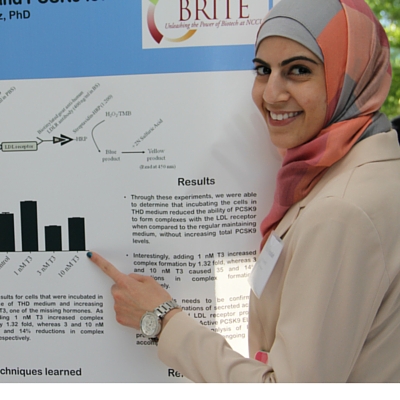
We here at the Research Triangle Park Foundation don’t always host poster sessions — but when we do, we bring in the brightest students around.
That the students from NC Central University’s BRITE program are indeed incredibly bright was immediately clear to everyone who joined the recent poster session held at The Frontier’s Bridge, a new space for events and gatherings at RTP. As faculty, friends, and representatives from RTP companies wandered through the bridge to the lilting sounds of a harp, wine and delicious snacks in hand, students explained the results of laboratory experiments studying, for example, how effective certain drugs are in limiting neuronal cell damage during a stroke, or compounds that might be used to improve pancreatic cancer treatments.
“I used a formula to detect interactions between PCSK9 and LDL receptors,” explained Razan Abdallah, who is graduating in May with a degree in pharmaceutical sciences and a minor in chemistry. Her poster presented her research on “The Effects of THD Medium on Complex Formation and PSSK9 Levels.” With the patience of a tutor, she explained how the THD medium reduced the ability of PCSK9 to form complexes with the LDL receptor, which essentially meant “we were able to degrade the LDL receptors so we can keep the good cholesterol and remove the bad.”
The research, and the poised and polished students who presented it, were brought to us by NCCU’s Biomanufacturing Research Institute and Technology Enterprise (BRITE), North Carolina’s only formal biotech degree program. BRITE prepares students for careers in biotechnology and biomanufacturing — so what better place to present research in progress than RTP, a thriving hub of biotech and biomanufacturing in a state that boasts more than 600 biosciences companies?
“This is our chance to show RTP what we do, what makes us special,” said Natacha Janvier-Derilus, a molecular biologist formerly with GlaxoSmithKline and now senior academic adviser, recruiter and student service specialist for BRITE. “If you’re doing a great job, you’ve got to toot your own horn! And this is a much more fun and relaxed environment than our regular poster sessions, where the students are being graded. Here they are just getting to talk about what they do.”
The showcase of student work was just part of what Lisa Jemison, director of programs at RTP Foundation, hoped to accomplish when she invited BRITE to come to RTP. Like the posters themselves, the poster session had a big idea behind it: To not only bring potential employers together with potential employees, but also to link business and education in the shared enterprise of creating a better future. It’s an idea Jemison hopes to continue replicating, with more poster sessions and other programs that help RTP companies connect to the students of today who will lead the labs of tomorrow.
“We want to welcome people here, we want to support education, we want to help create meaningful jobs and lift up the state of North Carolina,” Jemison said. “We want to bring more universities here and continue to do whatever we can to bring the research community together. We need these students here. We need them to stay in North Carolina.”
“The students here today are not just the best students at NCCU, but they are the best students in the state,” added Anita Jackson, an MD and MPH and BRITE’s interim director, as she addressed the group gathered at the poster session. “BRITE students are the reason that life sciences companies come to N.C.”
Indeed, many RTP companies visited the poster session with recruiting in mind. “You never know who you might meet,” said Bob Miles, a senior recruiter for RTI, as he collected students’ business cards. We want to meet as many students as we can and see if we can make a match for current openings. If we do not currently have a role that aligns with their skillset, we always like to remain in touch for potential future opportunities.”
De’Ajree Branch was thrilled to have a chance to show off her passion for biology and to network toward a job in a field she loves. “I graduate in May, and I am actively looking for a job,” she said, after giving a two-minute synopsis of her research on new treatment possibilities for triple negative breast cancer — an especially aggressive cancer that is resistant to many common treatments. “I want to find something where I can keep becoming a better biologist and better chemist.”
To learn more about the BRITE program, contact Natacha Janvier-Derilus at NC Central University. And to share ideas for connecting RTP companies to students, contact Lisa Jemison at lisa.jemison@rtp.org.